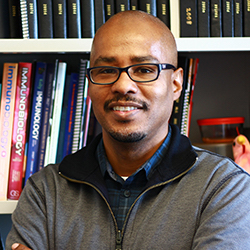Faculty Who Failed Series: Avery August

October 23, 2023
Graduate school is a time for students to push themselves, try new things, and explore. It’s also a time when students are likely to experience what feels like failure. These small or large challenges along the way to your degree are to be expected, and most faculty members experienced such stumbles themselves in graduate school.
To share stories of successful people who have overcome the setbacks that come with pursuing a graduate degree, we’re interviewing faculty members about how they “failed” in their academic careers. The Faculty Who Failed series highlights how resilience can carry you through the tough times in your degree program and come out of the experience stronger and better prepared for future challenges.
Read about Deputy Provost and Professor of Immunology Professor Avery August‘s experiences.
Can you describe a time you felt like you failed in graduate school? This could be a time when an experiment didn’t work out, you considered leaving (or did leave) your program, etc.
At the end of my third year in graduate school, I had to change advisors and labs and start a completely new project in a different lab. I almost left graduate school at that time, but I felt that I couldn’t give up, so I eventually started over in a new lab.
How did you bounce back from your perceived failure, or what got you through to the other side?
I felt that I couldn’t give up and disappoint my family who were so proud of my accomplishment, so I eventually redoubled my efforts to complete my Ph.D.
What lessons did you learn from this experience?
I learned that even though I did not have any formal “results” to show for the first three years of graduate school, it was an extremely valuable experience, because I was learning to do science during that period, making all the mistakes one could make. This made it a lot easier (and faster) to start a brand new project as I now knew what worked and what didn’t, and made a lot fewer mistakes.
How did you use this experience to become better at what you do?
This experience made me realize that no time is truly “wasted.” There is always something that can be learned (e.g., what doesn’t work), which is equally as valuable as learning what works. This view can be hard for those early in their careers as students, as we don’t always portray the value of learning from mistakes.
What advice do you have for current graduate students who might be struggling or in a comparable situation?
The graduate student experience is but a small part of your eventual career, and taking the time to step back to appreciate all aspects of the journey, the highs from the new discoveries and progress being made, but also the lessons learned from mistakes and setbacks. It’s all valuable in the end. The graduate student period is a truly unique opportunity to develop and learn, as this is the place and time to have such formative experiences in preparation for future success.
